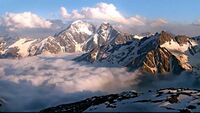Askali
This article is incomplete because it is pending further input from participants, or it is a work-in-progress by one author. Please comment on this article's talk page to share your input, comments and questions. Note: To contribute to this article, you may need to seek help from the author(s) of this page. |
Askali Socialist Republic | |
|---|---|
| Capital and largest city | Sogumi |
| Recognised national languages | Askali |
| Ethnic groups | Askali >99.9% |
| Demonym(s) | Askali |
| Government | Unitary Socialist hybrid regime |
| Legislature | The Senate (also the High Court and body that appoints executive officials) |
| Establishment | |
• Askali Empire | 1638-1934 |
• Askali Socialist Republic | 1949- |
| Area | |
• Total | 1,174,510 km2 (453,480 sq mi) |
| Population | |
• 2020 census | 40,001,792 |
• Density | 34.06/km2 (88.2/sq mi) |
| GDP (nominal) | 2019 estimate |
• Total | $949,086,344,792 |
• Per capita | $23,726 |
| Gini | 0.19 low |
| Driving side | left |
Askali is a country in the cool temperate latitudes of the Northeastern continent, Kula. It is situated between the high Askali Alps to the east and the ocean separating it from Miras to the west. Askali is the home of the Matraist(see Matraism ) faith, and was historically notable for its former colonial empire. In the present day, Askali is a Socialist State which retains significant naval capacity.
Etymology
Askali comes from a descriptive word in the country's ancient speech meaning "beside the sea".
Geography
Askali's geography is dominated by the powerful forces of glaciation and volcanism that have shaped the country. To the West, the crust of the ocean subducts beneath the country, crumpling the surface near Askali and raising its spectacular mountains to almost 6 km in height. Meanwhile, the melting of the crust generates volcanic activity which is very frequent. Earthquakes are too, and the subduction zone near Askali is one of the longest and most powerful in the world, capable of generating Earthquakes such as the M 9.0 that struck the country in 1788. Almost all of the country except for the small coastal plains and river valleys is rugged mountainous terrain unsuitable for habitation.
Climate
Cool and Temperate, Askali summers struggle to warm above 20 C even in the south, and winter temperatures are low enough for snowfall across the entire country, but winter temperatures are also relatively mild and are rarely below -10 C except in the north and in the mountains. The entire country is extremely rainy, cloudy, and foggy. For example, The capital Sogumi receives 80 inches of rain a year, but most coastal locations receive over 150 inches of rain, and most places are overcast 75%-80% of the days out of the year. Askali is famed for its four seasons, a brief mild and green summer, a stunning fall where the country's old growth deciduous forests become gold and red, a windy, snowy winters where the sun often rises later than 9:00, and wet, mild springs. The far north is entirely different however, its extreme northern latitude means that the outlying islands are snowbound year-round.
Environment
Askali is dominated by forests; 95% of the country is covered by woods home to a variety of deciduous (Beech, Maple, etc) and a few coniferous species like Sitka Spruces. The country has rich fishing grounds due to the mixing of cold and warm waters off its coast. It is also notable for the relatively large continental ice fields in the high Askali alps. The national animal of Askali is the wolf.
History
Ancient History
Early on the the present era, the cultivation of rice and barley began in Southern Askali, most of Askali's civilization is still centered here since Southern Askali is the limit for rice cultivation. Small villages grew into early feudal divisions protected by mercenary warriors. Most people were smallholding farmers.
Rise of Matraism and the Crusaders
Matraism was a reaction to the moral ills of the early feudalistic society, and increasing strife and famine following population growth. The Matraist hermit monk masters, called the shadowed masters preached detachment from the material world to realize the true nature of reality. The monastic orders they established eventually became the most powerful organizations in society and organized crusades to conquer the country's north and convert them. Following this, they turned outward, periodically attacking as far as Miras. Eventually social strife required the monks appoint a defender of the faith out of the lay members of society to assist in administration.
The Askali Empire (1638-1934)
The defender of the faith eventually became the sole power in the country's government, and the monks turned again to isolation. The new government modernized the military, moved the capital to Sogumi and built a new power base there, centralizing the government, and financed colonial ventures across the world to acquire valuable goods such as tea, nutmeg, and pepper for sale domestically and in Miras for even higher profits. The country became a strong naval power, and was at its height in the 19th century, when Askali's industrialization reached its peak, its population grew, its technological capacity and innovation increased, and its Romantic era cultural output was famed worldwide.
War and the Socialist Republic (1934–present)
Eventually, the cost of maintaining the colonies and protecting them against attack and uprising proved too much, and the government defaulted on its debt in 1934. This caused the 'zaibatsu', corporations driving the war and economic engine to fail. Mass strikes led to government repression, which led to revolution. After a brutal civil war, the socialist faction was victorious, nationalized key industries, expelled or killed the zaibatsu families, and began a campaign of re-industrialization and government education to train the workforce required for an advanced economy.
Politics
The Senate and The Departments
The government is nominally a Republic, though party affiliation is banned (read: effectively one party). The federal government has a single legislative assembly, called the Senate in English, which is also the highest court. The executive powers are not vested in any one person but are rather delegated by the senate to departments which can be formed at any time by a decree. Departments can be something as small as a regulatory agency for water quality and environmental health, or as expansive as essentially a government owned and operated industry like the power grid underneath the department of Energy. The head of state does not technically exist, its responsibilities being shared amongst the senate and departments, though the senate appoints a de facto international representative on a regular basis. Federal power is strong, and though while local jurisdictions are more democratic, federal bureaus can easily interfere with their affairs.
Senators are not directly elected, but rather chosen by regional deputies, which are decided by local councils, which are run by whomever cares to show up. In effect, senatorial positions are appointments masquerading as democratic affairs. People in this country tend to care little for politics unless they are involved in the government or only when a particular area of governance seriously impacts them. Department employees- civil servants, are completely unelected. They sit exams after a classical secondary school education to qualify and usually get further degrees, typically in administration or engineering. It is often said that these departments of educated and appointed bureaucrats are the real power in the country, at least in most practical matters.
Foreign relations
Askali supports the International Revolution of the Proletariat, and its fellow Socialist and Matraist countries!
Military
Askali does not have a draft, national service, or significant reserves of infantry. The country mostly uses a small, professional army in the event of the defense of the homeland. For overseas operations, the country funds a network of foreign proxies and 'freedom fighters', as well as small foreign divisions. The nation has possessed a capable navy for the past several centuries however, with several aircraft carriers, numerous submarines, and basing agreements in former colonies to project power across a significant proportion of the globe. The country's air capabilities are likewise advanced, specifically in the realm of stealth vehicles and missile delivery and defense systems (and while presently not especially useful except for certain cargo operations that require carrying high payload and landing in relatively unimproved areas, the air force maintains dirigible capacity). The country's native aerospace industry is advanced, as the economic points attest. Askali has a small nuclear arsenal.
Economy
The economy is heavily regulated and often coordinated by the federal government. The national economy is dominated by large monopolies similar to postwar Japanese keiretsu, except that these companies are owned essentially entirely by the government, but otherwise operated autonomously by the workers within the confines of the law. Other sectors such as the defense sector, transportation, communication, healthcare services, and the power grid are owned and operated solely by the government. The nationalized central bank issues long term low interest loans to government owned and backed 'workers' collectives' (Askali keiretsu) that enable them to operate at lower profit margins. The intentionally weakened currency makes domestic manufactured exports relatively cheaper, and their design by hard nosed engineers from the Socialist technical universities makes products from Askali known worldwide for their durability, design, and lower cost. The other, smaller industries such as local inns or restaurants are typically run by either co-operatives or families. Farming of staple crops is a substantial portion of the rural economy, mostly for heavily subsidized domestic consumption. In the world of personal finance, progressive taxation, the expensiveness of imports, and generally lower wages (though universal benefits) of jobs in Askali create a high domestic propensity to save, lowered consumption, and often sluggish but steady economic growth in recent years as the country's human capital and industrial potential have been already fully accessed.
Demographics
Ethnic groups
Virtually everyone in Askali is Askali themselves. Immigration to the country is difficult and almost non-existent.
Major cities
Sogumi and the area around it is home to a majority of the population. The north is extremely sparsely populated, and 90% of the country is forested.
Language
Askali is a language isolate with SOV word order, Ergative alignment, and complicated verbal and nominal morphology including spatial cases, verb compounding, and noun incorporation.
Religion
Matraism is the official faith of Askali, certain foreign religions classified as 'cults' are heavily persecuted.
Culture
The Askali people are known for being indirect and have complicated rules of politeness in a variety of social circumstances. Their society is based around the concept of Negative Face, which they call Sachari.
Music
Romantic Era composition in Askali is world-renowned, the symphonies and operas of Anatela Sagadeli, Chesko Noguvera, and others are among the global canon of classical music.
Cinema
Fashion
Media
Society
Cuisine
Sports




